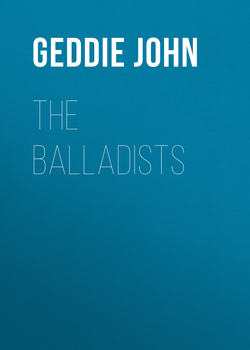The Balladists

Реклама. ООО «ЛитРес», ИНН: 7719571260.
Оглавление
Geddie John. The Balladists
PREFACE
CHAPTER I. BALLAD CHARACTERISTICS
CHAPTER II. BALLAD GROWTH AND BALLAD HISTORY
CHAPTER III. BALLAD STRUCTURE AND BALLAD STYLE
CHAPTER IV. THE MYTHOLOGICAL BALLAD
CHAPTER V. THE ROMANTIC BALLAD
CHAPTER VI. THE HISTORICAL BALLAD
CHAPTER VII. CONCLUSION
Отрывок из книги
Who would set forth to explore the realm of our Ballad Literature needs not to hamper himself with biographical baggage. Whatever misgivings and misadventures may beset him in his wayfaring, there is no risk of breaking neck or limb over dates or names. For of dates and names and other solid landmarks there are none to guide us in this misty morning-land of poetry. The balladist is 'a voice and nothing more' – a voice singing in a chorus of others, in which only faintly and uncertainly we sometimes fancy we can make out the note, but rarely anything of the person or history, of the individual singer. In the hierarchy of song, he is a priest after the order of Melchisedec – without father or mother, beginning of days or end of life.
The Scottish ballads we may thus love and know by heart, and concerning their preservation, collection, collation, we may gather a large store of facts. But the original ballad-writers themselves must remain for us the Great Unknown. Here and there one can lay down vague lines that seem to confine a particular ballad, or group of ballads, within particular bounds of place and of time. Here and there one seems to get a glimpse of the balladist himself, as onlooker or as actor in the scenes of fateful love and deathless grief which he has fixed for ever in the memory of men of his race and blood. There are passages in which, in the light and heat of battle, or in agony of terror or sorrow, we are made to see something of the minstrel as well as his theme. But by no research are we likely at this late date to recover any clew to the birthplace or to the lineaments of the life and face of the grand old poet who wrote the grand old ballad of Sir Patrick Spens; nor do towns contend for the honour of having produced the sweet singer of Kirkconnel Lea, the blithe minstrel of Glenlogie, or the first of all the bards who made the Dowie Dens of Yarrow vocal with the song of unavailing sorrow.
.....
But the native-grown ballad takes also colour from the ground whence it springs. It has the tang of the soil as well as the savour of the blood. Fletcher of Saltoun's hackneyed epigram, 'Let me make a country's ballads, and let who will make its laws,' does not embody all the truth. A country and the race inhabiting it may not be responsible for the laws that govern it. But a country and a people may rightly be tried and judged by their ballads – their own handiwork; their own offspring. The more cultured and highly-developed products of a national literature, however healthy, however strong and beautiful, must always owe much to neighbouring and to universal influences. Like the language and manners of the educated classes of a nation, they conform more or less to models of world-wide and age-long acceptance among educated men. But in the ballad one goes to the root of national character, to the pith and marrow of national life and history.
What then, thus questioned, do the Scottish ballads teach us of Scotland and the Scots? Surely much to be proud of. They are among the most precious, as they are among the oldest, of our possessions as a people. Nay, it may be held that they are the best and choicest of all the contributions that Scotland has made to poetry and story. They are written in her heart's blood. Even the songs of Burns and the tales of Scott must take second rank after the ballads; their purest inspiration was drawn from those rude old lays. In this field of national literature, at least, we need not fear comparison with any other land and people. Our ballads are distinctly different, and in the opinion of unbiassed literary judges, also distinctly superior to the rich and beautiful ballad-lore of the Southern Kingdom. One can even note an expressive diversity of style and spirit in the ballads originating on the North and on the South margin of the Border line. The latter do not yield in rough vigour and blunt manliness to the ballads grown on the northern slope of Cheviot. Chevy Chase may challenge comparison with The Battle of Otterburn, and come at least as well out of the contest as the Percy did from his meeting with the Douglas; and in many other ballads which the two nations have in common —The Heir of Linn, for example – the English may fairly be held to bear away the bell from the Scottish version. We do not possess a group of ballads pervaded so thoroughly with the freedom and delight of living under 'the leavés greene' as those of the Robin Hood Cycle; although we also have our songs of the 'gay greenwood'; although bows twanged as keenly in Ettrick Forest and in Braidislee Wood as in Sherwood itself, and we can even claim, partly, perhaps, as a relic of the days when the King of Scotland was Prince of Cumbria and Earl of Huntingdon, the bold Robin and his merry men among the heroes of our ballad literature.
.....